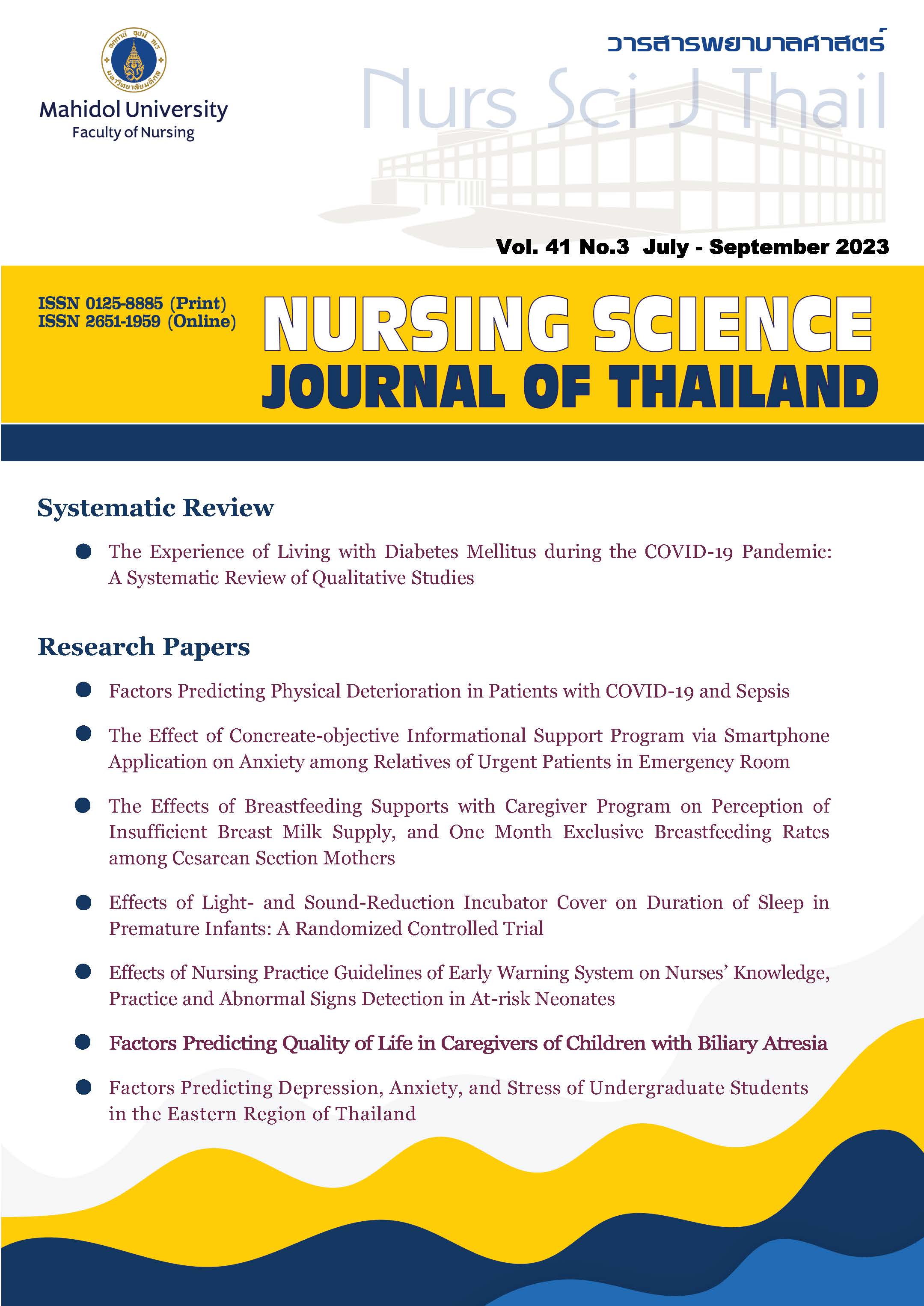Factors Predicting Quality of Life in Caregivers of Children with Biliary Atresia
Main Article Content
Abstract
Purpose: This study aimed to examine the predictive power of children’s age, caregiver stress, caregiver burden, and social support on quality of life in caregivers of children with biliary atresia.
Design: The predictive correlational study design.
Methods: The study sample included 85 caregivers of children with biliary atresia who were brought for treatment at the out-patient departments of pediatric surgery departments and the Gastrointestinal Disease Clinic of two super-tertiary hospitals. Data were collected using 1) The demographic data questionnaire; 2) Caregiver burden scale for caregivers of children with biliary atresia; 3) The stress questionnaire for caregivers of children with biliary atresia 4) The social support questionnaire for caregivers of children with biliary atresia; and 5) The World Health Organization Quality of Life Brief Version (WHOQOL-BREF). Data were analyzed by using descriptive statistics and step-wise multiple regression statistics.
Main findings: Significant predictors of quality of life in caregivers of children with biliary atresia included social support, the strongest predictor ( = .529, p < .001), followed by stress (
= .276, p = .009) and caregiver burden (
= .254, p = .016) respectively. All three variables together could account for 54% of the variance explained in quality of life among caregivers of children with biliary atresia (R2 = .54).
Conclusion and recommendations: The predictability of social support, caregiver stress and burden on quality of life in caregivers of children with biliary atresia found in this study gives supportive evidence for healthcare personnel to develop a program for promoting quality of life among this population. Roles of social support, strategies for stress reduction, and attitude towards caregiver burden should be focused in the program to yield a promising result on the caregivers’ quality of life.
Article Details

This work is licensed under a Creative Commons Attribution-NonCommercial-NoDerivatives 4.0 International License.
Copyright Notice: Nursing Science Journal of Thailand has exclusive rights to publish and distribute the manuscript and all contents therein. Without the journal’s permission, the dissemination of the manuscript in another journal or online, and the reproduction of the manuscript for non-educational purpose are prohibited.

Disclaimer: The opinion expressed and figures provided in this journal, NSJT, are the sole responsibility of the authors. The editorial board bears no responsibility in this regard.
References
Tiao M-M, Tsai S-S, Kuo H-W, Chen C-L, Yang C-Y. Epidemiological features of biliary atresia in Taiwan, a national study 1996-2003. J Gastroenterol Hepatol. 2008;23(1):62-6. doi: 10.1111/j.1440-1746.2007.05114.x.
The 72-Year Ward 8th Floor West and The 72-Year Ward 8th Floor East, Siriraj Hospital. Number of children with biliary atresia in hospital [Statistics]. Bangkok: Siriraj Hospital; 2018. 3 p. (in Thai).
Sundaram SS, Mack CL, Feldman AG, Sokol RJ. Biliary atresia: indications and timing of liver transplantation and optimization of pretransplant care. Liver Transpl. 2017;23(1):96-109. doi: 10.1002/lt.24640.
Ruangtrakool R. Biliary atresia. In: Mungnirandr A, editor. Common pediatric surgical diseases in outpatient practice. 1st ed. Bangkok: October Printing; 2017. p.1-13. (in Thai).
Erlichman J, Flick JA, Loomes K. BMJ best practice: biliary atresia [Internet]. London: BMJ; 2017 [cited 2018 Jul 2]. Available from: https://bestpractice.bmj.com/topics/en-us/739.
Lampela H, Pakarinen MP, Jahnukainen T, Jalanko H, Kosola S. Quality of life and parental worrying in a national cohort of biliary atresia children living with their native livers. J Pediatr Gastroenterol Nutr. 2017;64(6):883-7. doi: 10.1097/MPG.0000000000001516.
Valença MP, de Menezes TA, Calado AA, de Aguiar Cavalcanti G. Burden and quality of life among caregivers of children and adolescents with meningomyelocele: measuring the relationship to anxiety and depression. Spinal Cord. 2012;50(7):553-7.
Arafa MA, Zaher SR, El-Dowaty AA, Moneeb DE. Quality of life among parents of children with heart disease. Health Qual Life Outcomes. 2008;6:91. doi: 10.1186/1477-7525-6-91.
Gregory MRB, Prouhet PM, Russell CL, Pfannenstiel BR. Quality of life for parents of children with congenital heart defect: a systematic review. J Cardiovasc Nurs. 2018;33(4):363-71. doi: 10.1097/JCN.0000000000000466.
Chanpa M, Sanasuttipun W, Srichantaranit A. Relationships among children’s age, caregivers’ perceived severity of illness, stress, social support and quality of life among caregivers of children with congenital heart disease. Nursing Science Journal of Thailand. 2018;36(1):73-86. (in Thai).
Salvador Á, Crespo C, Martins AR, Santos S, Canavarro MC. Parents’ perceptions about their child’s illness in pediatric cancer: links with caregiving burden and quality of life. J Child Fam Stud. 2015;24(4):1129-40. doi: 10.1007/s10826-014-9921-8.
Lohmae U, Wiroompanich W, Wattanasit P. Relationships between burden of care, social support and quality of life among mothers of children with congenital heart disease. Journal of Nursing and Health Science. 2016;17(2):27-42. (in Thai).
Ungwattansirikul W. Predicted factors of quality of life in family caregiver of person with cancer receiving chemotherapy [master’s thesis]. Bangkok: Mahidol University; 2007. 158 p. (in Thai).
Pitimana-aree S. Predicted factors of quality of life in family caregiver of surgical oncology patients [master’s thesis]. Bangkok: Mahidol University; 2007. 173 p. (in Thai).
Toonsiri C, Sunsern R, Lawang W. Development of the burden interview for caregivers of patients with chronic Illness. Journal of Nursing and Education. 2011;4(1):27-42. (in Thai).
Lazarus RS, Folkman S. Stress, appraisal, and coping. New York: Springer; 1989. 456 p.
Cobb S. Social support as a moderator of life stress. Psychosom Med. 1976;38(5):300-14. doi: 10.1097/00006842-197609000-00003.
Schaefer C, Coyne JC, Lazarus RS. The health-related functions of social support. J Behav Med. 1981;4(4):381-406. doi: 10.1007/BF00846149.
Mahatnirunkul S, Tantipipattanakul W, Pumpaisanchai W, Wongsuwan K, Phommanajirungkul R. Comparison of WHOQOL100 and the WHOQOL-BREF (26 items). Journal of Mental Health of Thailand. 1998;5(3):4-15. (in Thai).
Boonjai S. The methodology in nursing research. 5th ed. Bangkok: U&I Intermedia; 2010. 568 p. (in Thai).
Charatcharungkiat N, Wacharasindhu A. Quality of life among caregivers of children with autistic spectrum disorders and associated factors. Journal of the Psychiatrist Association of Thailand. 2013;58(3):233-44. (in Thai).
Feeley CA, Turner-Henson A, Christian BJ, Avis KT, Heaton K, Lozano D, et al. Sleep quality, stress, caregiver burden, and quality of life in maternal caregivers of young children with bronchopulmonary dysplasia. J Pediatr Nurs. 2014;29(1):29-38. doi: 10.1016/j.pedn.2013.08.001.


